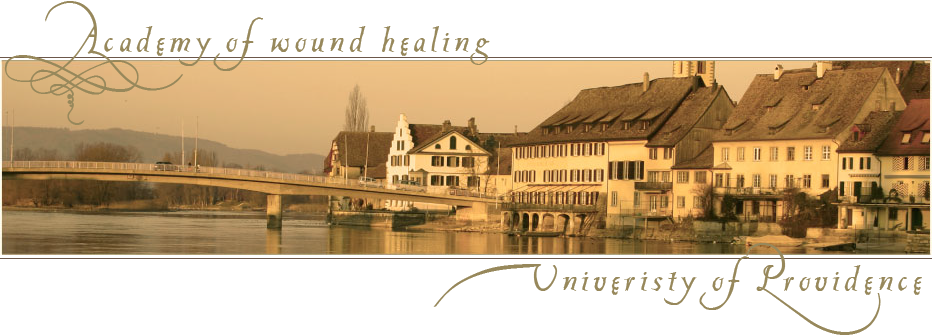The M.Sc. in Wound Healing must be completed within five years of enrolling. The Program Director must approve any request for an extension of this time limit.
The following standards will determine a student’s academic standing:
1. Students must maintain a GPA of 3.0 to complete the program successfully. Students may have a maximum of two grades (six credit hours) of “C” on their transcript that count toward the degree. Students may retake a course once to raise a “C” grade.
2. A student whose GPA drops below 3.0 will be placed on academic probation. The student then has two semesters to improve the GPA to a 3.0 or higher. If the student fails to do so, the student will normally not be allowed to continue in the program.
High standards of personal honesty and ethics are essential for those who are preparing for a career in wound healing. Students are expected to demonstrate integrity in their work as well as strong academics. Students who submit the work of others as their own or any fashion violate academic or professional ethics will be dismissed from the program. Any such incident shall be reported to the Provost of University of Providence for disciplinary action.
The full thirty-semester-hour curriculum may be completed in one academic year by means of synchronous online lectures and supervised independent study.
Listed below are the courses required to complete the M.Sc. in wound healing at Academy of Wound Healing / University of Providence.
[NOTE: The MSW prefix denotes masters-level courses in wound healing, including (synchronous) online lecture courses and independent study courses.]
Fifteen semester hours (credits) of coursework comprise the first-semester courses.
Fall Semester
MSW 501 Biology of Wound Healing 3 credits (Online)
MSW 502 Hygiene, Infection & Inflammation 3 credits (Online)
MSW 503 Wound Debridement 3 credits (Online)
MSW 504 Selection of Wound Dressings 3 credits (Online)
MSW 505 Medical Ethics* 3 credits (Online)
Total Credits = 15
[*NOTE: The curriculum includes a full-semester course in medical ethics taught by regular faculty of University of Providence. The goal is to ensure that the medical ethics curriculum faithfully reflect the teachings of the Catholic Church in their entirety.]
Fifteen semester hours (credits) of coursework and clinical clerkship comprise the second-semester courses.
Spring Semester
MSW 506 Treatment of Diabetes Ulcers 3 credits (Online)
MSW 507 Treatment of Decubitus Ulcers 3 credits (Online)
MSW 508 Treatment of Leg Venous Ulcers 3 credits (Online)
MSW 509 Medical Terminology 3 credits (Online)
MSW 510 Case Reports 3 credits (Online)
Total Credits = 15
Final examinations are scheduled during the last week of each term for all eight lecture courses in technical subjects, namely MSW 501 through MSW 504 during Fall Semester and MSW 506 through MSW 509 during Spring Semester.
All final exams shall be administered during the last week of each semester.
Final exams are administered in open-book and open-notes format.
Final exams are three (3) hours in duration.
The honor system applies to all examinations. Any infraction of the honor system shall be reported to the Provost / Vice President of University of Providence for disciplinary action.
There is no final examination, per se, for MSW 505 Medical Ethics. Instead, each student shall submit a 20-page term paper on a medical ethics topic of special interest to the student.
Example topics for term papers in MSW 505 Medical Ethics are:
“Medical Ethics of Using Birth Tissue
(Umbilical Cord and Amniotic Membrane)
in Wound Healing”
or
“Medical Ethics and Wound Management”
or
“Stem-cell-based Therapeutic Strategies to Treat Wounds”
or
“Ethical and Religious Directives for Catholic Health Care Services”
or
“What are the Components of Informed Consent?”
There is no final examination, per se, for MSW 510 Case Reports. Instead, each student shall present a live (online) 20-minute case report on a wound healing topic of particular interest to the student.
Example topics for MSW 510 Case Reports are:
“Bloodless Wound Healing in the Cornea”
or
“Wound Healing in Immunocompromised Patients”
or
“Wound Healing in Covid-19 Patients”
or
“Nutrition and Wound Healing”
or
“Alternative Treatment Options for Wounds”
or
“Diabetic Foot Care”
or
“Traditional Wound Healing in Native American Cultures”
For all eight lecture courses in technical subjects, course grades are based on final exam scores (only).
The grading scheme is as follows.
In other words, class participation and/or class attendance is not used as a metric in grading graduate-level (500-series) courses. That said, students should aim to attend all online lectures and are encouraged to ask questions /or make comments about the subject at hand.
Allow 1 week for examination results. Make-up exams are available for any student scoring less than 80% on any exam. Allow 2 weeks for make-up exam preparation. Students are allowed only one make-up exam for each course.
The course on medical ethics (MSW 505) shall be graded on a “Pass” or “Fail” basis.
The course on case reports (MSW 510) shall be graded on a “Pass” or “Fail” basis.
